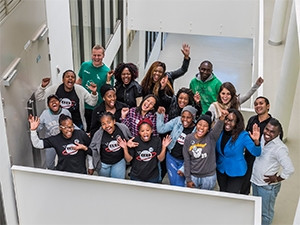
Young women from the Meta Economic Development Organisation (MEDO) space programme in the Western Cape last week made headway in designing Africa's first private satellite.
MEDO is a non-profit organisation registered in SA with a sister company MEDO London in the UK. The organisation launched the space programme in June last year with the aim of encouraging young women to enter science, technology, engineering and mathematics (STEM)-related fields.
MEDO's programme was developed in response to the organisation's observation that many corporates it works with experience a lack of skilled STEM employees - particularly female employees.
"It is predicted that 80% of all future jobs are STEM-related, with almost double the pay of non-STEM-related careers. So what we are trying to do is to give these young women the best chance out there," says Judi Sandrock, co-founder of MEDO Space.
At the bootcamp, the graduates built a prototype satellite of their selected design. The week began with the sharing and interrogation of ideas of the jobs that the satellite - MEDO Sat1 - should be tasked with.
Over 20 ideas were put forward and after rigorous discussion, debate and voting, two payload ideas were selected. Food security in Africa was a strong theme, as well as being able to detect natural disasters like fires and floods.
The group realised these goals could be achieved by the same payload of equipment, and the collaborative design process began.
Food for thought
Facilitating the week were graduates from the Cape Peninsular University of Technology (CPUT) - Angela Shumba, Leon Njouakoua and Khader Mananga; as well as graduates from the University of Cape Town - Monica Camarena and Abhijit Nath.
Taking the conversation into the real world, CPUT professor Robert Van Zyl and his team hosted the group at their Space Satellite Laboratory. The day began by tracking the CPUT satellite ZACube1 'TshepisoSat' as it orbits the earth. Two pass-overs were tracked and data was received from the satellite using the radio ground station at the laboratory.
The young women experienced a day in the life of a satellite engineer through practical demonstrations of the various projects and research being undertaken in the department, and started to build their mock-up satellite with the technical design of their payload.
Thursday last week saw these young women, as a group, present their mock-up satellite to a select audience.
"The young women made it very clear that food security is an issue for their future, and they want to make sure this satellite works towards finding solutions," says Sandrock. "The week was clear proof that when we put our minds together and apply technology, we can begin to tackle our challenges. The impact we are having with this programme is exceeding our boldest expectations."
Space and beyond
The group of aspiring space engineers hail from schools across the Western Cape, and consists of Sesam Mngqengqiswa, Abigail Meyer, Pheobyn Berdine Filander, Esihle Mazingi, Bhanekazi Tandwa, Asiphe Bunzi, Amanda Lutshetu, Brittany Bull, Nikiwe Jela, Siphelele Mzongwana, Loyisile Dlomo, and Erin Prins.
The MEDO Space team shared a long list of bursary opportunities as well as how to apply for these. This Women in STEM programme is being featured at the World Economic Forum for Africa in May, as recognition for the significant impact it is having, and will have on young people in Africa.
MEDO Space is running this project in Africa, introducing pre-matriculation young women to science and maths. The project has concentrated on organising weekend 'SPACEPrep' electronics workshops as well as week-long 'SPACETrek' camps during the school holidays.
The project - in collaboration with the US-based Morehead State University - aims to combat critical skills shortages, as well as challenge stereotypes. The plan is to launch satellites every year as part of a decade-long project, using the journey towards each launch as an opportunity to ignite interest in science and develop engineering skills.
MEDO Sat1 is on the launch manifest of Inter Orbital Systems and is due for launch in late 2016.
Share